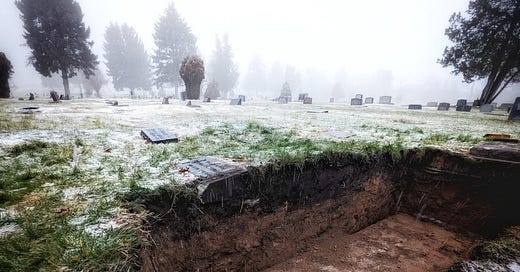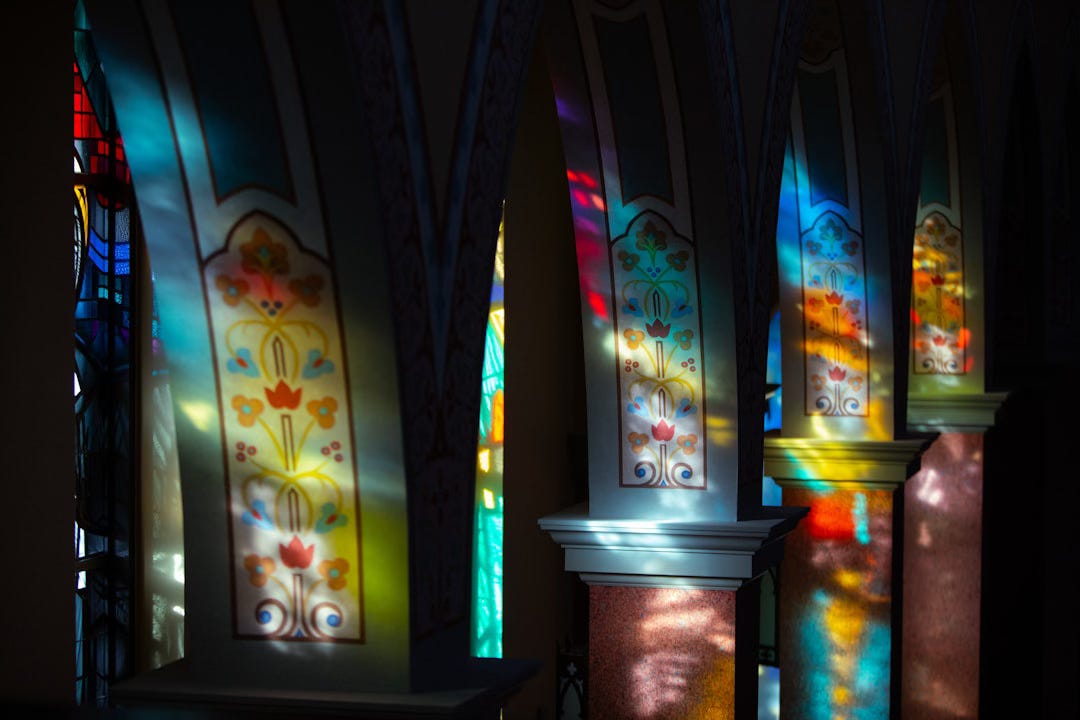What Happens When a Loved One Dies?
An Answer to the Eternal and Universal Question from the Heart of the Apostle Paul
The Corinthian Question About Death
There is no bigger question than the question about death and what happens when we die. Where do we go? Where do our loved ones go? What hope can anyone have for eternal life beyond the grave?
There are answers to these questions—at least some of them. We need not live in fear or anxiety. If we go back to the letter from the Apostle Paul to his favorite church in Corinth, we can see the beginnings of an answer that will bring confidence and strength to meet the coming days.
The Corinthians were anything but shy—they were outspoken and inquisitive, readily questioning and challenging ideas they found unclear or disagreeable.
Their questions about death and dying were particularly pressing. They wondered what happened when a person--a loved one or family member--died in the faith of Christ. Where did they go? What kind of body did they have?
These were not academic issues for them. The Corinthians were grieving in real time from the real losses of real friends. Where is the hope of faith?
Paul matched their boldness--especially on the subject of death and dying. He presented his theological views rooted in Jewish teachings, Greek philosophy, Roman pragmatism, and his own brushes with death. He provided a comprehensive explanation of the afterlife, addressing their concerns about mortality and comforting them in their grief over lost loved ones.
The church calendar passes into the celebration of All Saints on November 1st. The church remembers those who have died in the faith. But at any time, it is good to remember Paul's answer to this universal question. His response to their grief and concern likely filled the Corinthians with anticipation and joy for what awaited them beyond the grave.
It can have the same impact on us. Death is an enemy, Paul will say, but that doesn't mean we should fear it. As we will see, to mix many metaphors, death is a toothless tiger, a stinger-less wasp, and a fierce-looking dog whose bark is worse than the bite.
Death Gets Personal
I've been with countless grieving families who, after the initial shock of loss subsides, begin to whisper their deeper, perhaps more practical questions.
"Will I recognize my husband in heaven?"
"What exactly happens to us after we die?"
The Corinthians asked these questions. Their Greek minds, steeped in philosophical traditions about the soul's immortality, struggled with the Christian claim of bodily resurrection. It seemed impossible, perhaps even undesirable, that someone would be raised to life again.
Why would we want these bodies back? What form would they take? These aren't just theological puzzles—they are cries of the heart wrapped in words, prayers disguised as questions.
Better Call Paul?
Why should we trust Paul's perspective on death and what lies beyond? Why should his teaching be His authority stems from several profound sources.
First and foremost, he had a direct, transformative, top-line encounter with the risen Christ—someone he had previously believed dead and buried. The impact of the meet-up on the road to Damascus did more than change Paul’s mind about who Jesus was. It floored the man from Tarsus. He was blinded for days and must conclude that Paul entered into some kind of mystical download from God the Holy Spirit. Paul needed a thorough renovation of this thinking.
But Paul's insight into a theology of death went beyond even this. Throughout his ministry, he was repeatedly brought to death's doorstep through persecution, shipwrecks, and beatings. In these moments of extremity, he discovered firsthand the peace and confidence that a resurrection faith provides.
Even in his final letter, written from death row in a Roman prison (2 Timothy 4), we find no anxiety, only serene confidence about his approaching execution.
Perhaps most intriguingly, Paul had experienced what he calls being 'caught up to the third heaven' (2 Corinthians 12), where he witnessed things 'too glorious to tell.' When Paul speaks about death and resurrection, he speaks not just as a theologian, but as someone who had been granted a glimpse behind the veil.
Few others in history could claim such a comprehensive perspective: direct revelation from the risen Christ, firsthand encounters with death's threshold, and a mysterious glimpse into heaven itself.
The Keystone of Our Faith: Resurrection
We must understand that resurrection isn't merely an interesting theological concept or a historical curiosity. Paul states it bluntly: 'If only for this life we have hope in Christ, we are of all people most to be pitied' (1 Corinthians 15:19).
Resurrection is the keystone that holds all of the Christian faith together.
Without resurrection, hope dissolves, preaching becomes meaningless, and faith crumbles into nothing more than wishful thinking. The Corinthians needed to grasp—as we do today—that everything in Christian life hinges on this reality. When we speak of resurrection, we're not discussing a peripheral doctrine or a comforting metaphor. Easter isn't just about bunnies. We're addressing the very foundation of our faith, the reality that gives meaning to everything else we believe and practice.
To be wrong about resurrection isn't just to be mistaken—it's to be fundamentally deceived about the nature of existence itself.
So how does Paul explain the answers to the Corinthian questions?
First, A Seed
Paul begins where all good teachers do—with something his listeners know well. An image they can surely relate to.
"Look at a seed," he almost says. "When you plant it in the ground, what comes up looks nothing like what you buried." He's right! This simple agricultural idea of a seed in the ground opens up worlds of understanding. Just as an oak tree bears little resemblance to the acorn from which it grew, our resurrection bodies will be transformed far beyond our current imagination.
Yet—and this is crucial—they remain in continuity with who we are now. The oak tree doesn't become a pine; the wheat seed doesn't produce corn. Identity persists even through a transformation to new life.
Paul gets specific about these new bodies: "What is sown is perishable; what is raised is imperishable" (1 Corinthians 15:42). No more disease, no more aging, no more death. "It is sown in dishonor; it is raised in glory."
All our current limitations and weaknesses will be transformed into strength and capability. We're not left to merely imagine what this means. Paul points to Jesus' resurrection as our pattern.
After rising, Jesus could be touched and recognized. He ate fish on the beach with his friends. Yet he could also appear in locked rooms and ascend to heaven. He was himself, yet somehow more himself than ever before. He was resurrected, not resuscitated to die again (like Lazarus).
Paul’s teaching about death and resurrection extends far beyond this simple analogy about a seed. But this was all the Corinthians needed to know for now.
Living in Light of Resurrection Hope
This teaching can change how we live today. When Paul declares "Death is swallowed up in victory" (1 Corinthians 15:54), he's not offering mere comfort about the future. Dear was once an enemy to be feared, but now it lies defeated, its power broken by the promise of resurrection.
When we close the eyes of our loved ones for the last time, we know it isn't the last time. When we stand at graves, we stand there knowing that a transformation beyond imagination awaits.
As we remember the saints this All Saints' Day—those great clouds of witnesses who have gone before us—we can take comfort in knowing that they await their resurrection bodies just as we await ours.
The Rev. David Roseberry, an ordained Anglican priest with over 40 years of pastoral experience, offers leadership services to pastors, churches, and Christian writers. He is an accomplished author whose books are available on Amazon. Rev. Roseberry is the Executive Director of LeaderWorks, where his work and resources can be found.








I read this article yesterday and I began thinking about a conversation that I had with a group of ladies, on Wednesday in our Bible Study group. The question was "What do you imagine Jesus will say to people as they enter the great banquet, the wedding supper of the Lamb?" (Scripture reference John 14:1-4) From answering that question we began a discussion on the resurrection of our bodies.
Your article will be a blessing as to share with those ladies.
In Christ Alone, blessings to you and your gift of writing.
I ❤️’d reading this perspective! So comforting!